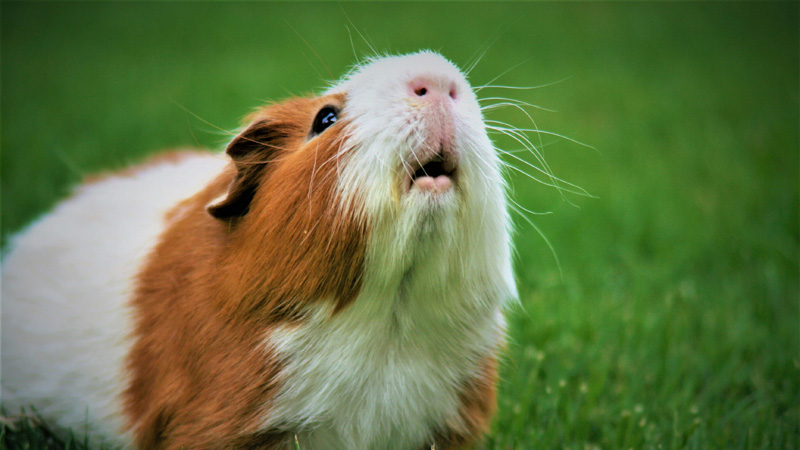What Do Guinea Pig Noises Mean?

Photo by Jack Catalano on Unsplash
Guinea pigs make a wide variety of sounds that they use to communicate their needs. As a guinea pig owner, it's important to understand these noises and what they mean so you can better care for your furry friend.
In this article, we will explore the different types of guinea pig noises, what they mean, and how you can respond to them.
1. Wheeking
Wheeking is one of the most common guinea pig noises and is characterized by a high-pitched, whistling sound. Guinea pigs usually make this noise when they are excited, hungry, or looking for attention. It can be compared to the way that a dog might bark when it wants to play or be fed.
Wheeking is often accompanied by other behaviors such as standing on their hind legs, making eye contact, and moving in the direction of the source of the noise. If you hear your guinea pigs wheeking, it's a good idea to check on them and make sure that they have access to food and water. You can also try engaging with them by offering a treat or taking them out to play.
2. Purring
Purring is a sign that your guinea pig is feeling happy and relaxed. It's often compared to the sound a cat makes when it's content. This noise is produced by vibrations in their vocal cords when they breathe.
Sometimes guinea pigs will purr when they are being petted or held, or when they are snuggled up in their bedding. This noise is a sign that they feel safe and comfortable in their environment.
3. Cutting
Chutting is a soft, rhythmic noise that guinea pigs use to communicate with each other. It sounds like a repeated "chut-chut" sound and is often accompanied by head bobs.
Guinea pigs usually make this noise when they are feeling content and relaxed. If you hear your guinea pigs chutting, it's a good sign that they are feeling comfortable and happy in their environment.
4. Teeth Chattering
Teeth chattering is a noise that guinea pigs make when they are feeling agitated or threatened. It sounds like a rapid clicking noise and is often accompanied by body language such as flattened ears and a tense posture.
Guinea pigs may chatter their teeth if they feel scared or are in pain. If you hear your guinea pig chattering its teeth, it's important to approach them slowly and calmly to avoid further stressing them out. Try to identify the source of their discomfort and remove it if possible.
5. Rumbling
Rumbling is a low-pitched noise that guinea pigs make when they are feeling amorous. It's often compared to a cat's purring but is deeper in tone. Male guinea pigs will often make this noise when they are trying to attract a female.
Female guinea pigs may also rumble when they are in heat or are receptive to mating. If you hear your guinea pigs rumbling, it's a good idea to keep them separated if you don't want them to mate and produce offspring.
6. Squeaking
Squeaking is a noise that guinea pigs make to communicate their displeasure or discomfort. It sounds like a high-pitched screech and usually happens when they are being handled roughly or are in pain.
If you hear your guinea pig squeaking, it's important to stop what you're doing and assess the situation. Check your guinea pig for any signs of injury or discomfort, and make sure that they are being handled gently.
7. Hissing
Hissing is a noise that guinea pigs make when they are feeling threatened or scared. It sounds like a soft, hissing noise and is often accompanied by other body language such as raised hackles and a tense posture.
If you hear your guinea pig hissing, it's important to back off and give them some space. Try to identify the source of their fear, and remove it if possible.
How to Respond to Guinea Pig Noises
As a guinea pig owner, it's important to understand what your guinea pig is trying to tell you through their noises. If you hear your guinea pigs wheeking, purring, or chutting, it's generally a sign that they are feeling content and happy. You can respond to these noises by offering them attention, treats, or a comfortable environment.
If you hear your guinea pigs' teeth chattering, squeaking, or hissing, it's a sign that they are feeling agitated or uncomfortable. In these situations, it's important to approach them calmly and try to identify the source of their distress. Often, removing the cause of discomfort or speaking softly to them can help to calm them down.
In general, guinea pig noises can be a helpful way for owners to understand their pets' needs and emotions. Responding appropriately to these noises can help to create a stronger bond between owner and pet and ensure that your guinea pigs lead happy and fulfilling lives.
Conclusion
Guinea pigs communicate with their owners and each other through a variety of noises that are rich in meaning. Understanding these noises can help owners recognize when their guinea pigs need attention, or food, or are feeling distressed. By responding appropriately and providing a comfortable environment, owners can help their guinea pigs feel happy and content.
You May Also Like
 Guinea PigGuinea Pigs vs. Hamsters: What Is the Difference?
Guinea PigGuinea Pigs vs. Hamsters: What Is the Difference? Guinea PigMale vs. Female Guinea Pig: What Is the Difference?
Guinea PigMale vs. Female Guinea Pig: What Is the Difference? Guinea PigHow Long Do Guinea Pigs Live?
Guinea PigHow Long Do Guinea Pigs Live? Guinea PigWhat Can Guinea Pigs Eat? A Comprehensive Guide
Guinea PigWhat Can Guinea Pigs Eat? A Comprehensive Guide Guinea PigA Comprehensive Guide to Types of Guinea Pigs
Guinea PigA Comprehensive Guide to Types of Guinea Pigs Guinea PigExploring the Softest Guinea Pig Breeds
Guinea PigExploring the Softest Guinea Pig Breeds